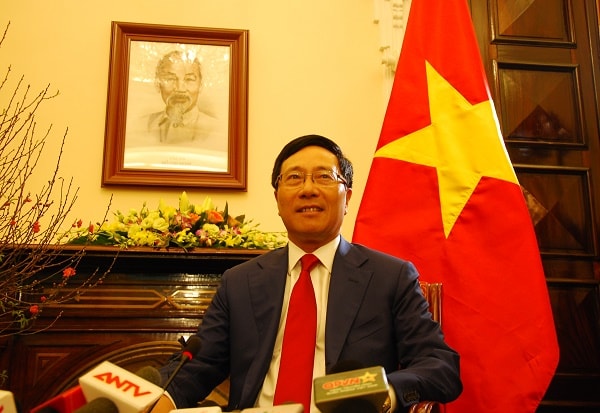'Vietnam will not change its independent and autonomous foreign policy'
The Deputy Prime Minister and Minister of Foreign Affairs affirmed that Vietnam will not change its independent and self-reliant foreign policy, pursuing peace and stability.
On January 5, Deputy Prime Minister and Minister of Foreign Affairs Pham Binh Minh held a press conference to review diplomatic work in 2016 and the challenges Vietnam will face in 2017.
 |
| Deputy Prime Minister and Minister of Foreign Affairs Pham Binh Minh at a press conference on the morning of January 5. Photo: Lan Huong |
2016 was a year of many upheavals in the world situation. In that context, what changes has the Vietnamese diplomatic sector made, Deputy Prime Minister?
2016 was a year of instability and unpredictability. The world witnessed events that decades ago would have never thought possible: the normalization of relations between the United States and Cuba, the Iran nuclear deal, or the UK leaving the European Union (EU) - Brexit. 2016 also witnessed a number of trends that went against the process of globalization and economic integration such as nationalism and populism; the traditional and non-traditional security situation became complicated.
In that context, our foreign affairs activities in 2016 are a continuation of the achievements of previous years. In 2016, Vietnam continued to implement the strategic partnership and comprehensive strategic partnership frameworks in depth. Heads of major economies such as France, the UK, the US, India, Russia... visited Vietnam and vice versa. Vietnam also carried out very active multilateral diplomatic activities such as participating in the Francophone Summit, the Non-Aligned Summit, and for the first time participating in the expanded G7 Summit in Japan...
At the regional level, Vietnam's position and role have been enhanced through regional conferences such as the AMECS 7 Summit, CLMV 8 and the Mekong Economic Forum (WEF).
It is forecasted that in 2017, the world situation will continue to have many unpredictable changes. What solutions does the Vietnamese diplomatic sector have to resolve these challenges, Deputy Prime Minister?
In the coming year, it is predicted that the political landscape of many countries will change with elections and party congresses. However, the important thing is that Vietnam promotes relations not with one government or one party, but instead builds a framework of relations with other countries. Therefore, bilateral relations will not be affected when countries change governments.
On Vietnam's side, we will not change our independent and autonomous foreign policy, with the biggest goal being to diversify and multilateralize relations on the basis of serving the interests of the Vietnamese people as well as other countries. With the motto of being friends with all countries and multilateralizing, Vietnam will continue to deepen relations with other countries within the framework of strategic partnership and comprehensive strategy. Vietnam has proactively participated in multilateral mechanisms, signing many agreements in 2016. Based on these foundations and measures, I believe that Vietnam will overcome the challenges in foreign affairs in 2017.
There are some opinions that, after one year of establishing the ASEAN Community, the achievements are still unclear. What is the Deputy Prime Minister's assessment of this opinion?
- In early 2016, the ASEAN community was officially formed, but this is not the destination but a journey of ASEAN countries in implementing all the targets of the entire community. Together with ASEAN countries, the levels may be different but basically we have completed the goals of the ASEAN community.
With that spirit, in 2016, ASEAN countries established a unified basis for production facilities, created a unified market, removed tariff barriers, and facilitated production linkages. This is the current achievement of the ASEAN economic community. For Vietnam, there are still problems that are not as expected. Vietnam's trade in ASEAN has decreased by 8%. This is unexpected because while some countries have taken advantage of the large market of 650 million people, promoting increased intra-bloc trade, our trade has declined. This raises the issue of the competitiveness of Vietnamese enterprises in the regional market.
At a press conference on the morning of January 5, Deputy Prime Minister Pham Binh Minh said that US Secretary of State John Kerry will visit Vietnam next week. The visit will promote the relationship between the two countries within the framework of the comprehensive partnership that has been established. At the same time, it reaffirms the maintenance of US foreign policy towards Vietnam regardless of which party comes to power. General Secretary Nguyen Phu Trong will visit China at the invitation of General Secretary and President Xi Jinping. The visit will strengthen the comprehensive strategic partnership between Vietnam and China, affirm Vietnam's independent foreign policy and strengthen relations with countries, including China, an important strategic partner of Vietnam. |
According to Kinhtedothi.vn

